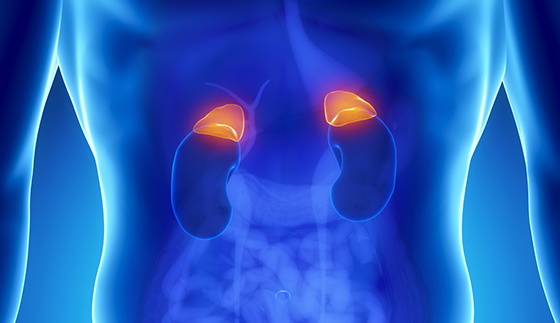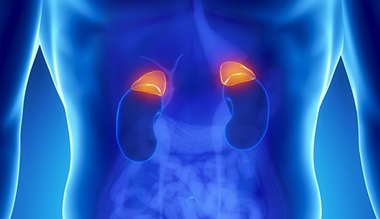Cushing's Syndrome
What is Cushing's syndrome?
Cushing's syndrome is a hormonal disorder. It’s caused when you have high levels of the hormone cortisol over a long time. Cushing's syndrome is fairly rare. It most often affects adults who are 20 to 50 years old. It is sometimes called hypercortisolism. You will probably need to see a specialist in hormone-related diseases called an endocrinologist. This is so he or she can at least confirm your diagnosis and help you explore choices for care.What causes Cushing's syndrome?
Cushing's syndrome happens when you have too many corticosteroids in your body. When the disorder often starts with the pituitary gland, the condition is called Cushing's syndrome. The gland makes too much adrenocorticotropin hormone (ACTH). That causes the adrenal glands to make too many corticosteroids.
Another main cause is taking steroid medicines like prednisone for a long time. These are sometimes used to treat chronic diseases such as asthma. Other causes include:
- Certain lung cancers
- Benign or cancerous tumors on the pituitary or adrenal glands
- An inherited endocrine disorder
Who is at risk for Cushing's syndrome?
You may be more likely to have Cushing's syndrome if you:
- Are overweight or obese
- Have type 2 diabetes that is not under control and have high blood pressure
What are the symptoms of Cushing's syndrome?
Each person may have symptoms in a different way. These are the most common signs and symptoms:
- Upper body obesity with thin arms and legs
- Round face
- Increased fat around neck or a fatty hump between the shoulders
- Reddened, thin, fragile skin that is slow to heal
- Reddish-blue stretch marks on the underarms, belly, thighs, buttocks, arms, and breasts
- Bone and muscle weakness
- Severe tiredness (fatigue)
- High blood pressure
- High blood sugar
- Irritability and anxiety or depression
- Extra facial and body hair growth in women
- Irregular or stopped menstrual cycles in women
- Reduced sex drive and fertility in men
These symptoms may look like other health problems. Always see your healthcare provider for a diagnosis.
How is Cushing's syndrome diagnosed?
Your healthcare provider will ask about your past health. You will also need an exam. These procedures may also help with a diagnosis:
- 24-hour urinary test to measure the level of corticosteroid hormones
- CT scan. This scan uses X-rays and computer technology to make detailed images of the body.
- MRI. This scan creates detailed pictures of internal organs and structures.
- Dexamethasone suppression test. This test can tell whether your body is making more cortisol than normal. If so, you would need more tests. You might also need more tests to tell if the extra amount of hormones is coming from the pituitary gland or from a tumor elsewhere in your body.
- Other lab tests. These should include a late evening salivary cortisol level and an ACTH level.
How is Cushing's syndrome treated?
Your healthcare provider will figure out the best treatment for you based on:
- How old you are
- Your overall health and past health
- How sick you are
- How well you can handle specific medicines, procedures, or therapies
- How long the condition is expected to last
- Your opinion or preference
Treatment depends on what is causing Cushing's syndrome. You may need surgery to remove tumors or the adrenal glands. Other treatments may include:
- Radiation
- Chemotherapy
- Certain hormone-inhibiting medicines
When should I call my healthcare provider?
Tell your healthcare provider if your symptoms return or get worse. Also let him or her know if you get new symptoms.Key points about Cushing's syndrome
- Cushing's syndrome often happens when pituitary gland makes too much adrenocorticotropin hormone. That causes the adrenal glands to make too many corticosteroids.
- Cushing's syndrome is fairly rare. It most often affects adults who are 20 to 50 years old.
- Symptoms may include upper body obesity, round face, and thin skin with bruising.
- Treatment depends on the cause. It may include surgery, radiation, chemotherapy, or medicines.
Next steps
Tips to help you get the most from a visit to your healthcare provider:- Know the reason for your visit and what you want to happen.
- Before your visit, write down questions you want answered.
- Bring someone with you to help you ask questions and remember what your provider tells you.
- At the visit, write down the name of a new diagnosis, and any new medicines, treatments, or tests. Also write down any new instructions your provider gives you.
- Know why a new medicine or treatment is prescribed, and how it will help you. Also know what the side effects are.
- Ask if your condition can be treated in other ways.
- Know why a test or procedure is recommended and what the results could mean.
- Know what to expect if you do not take the medicine or have the test or procedure.
- If you have a follow-up appointment, write down the date, time, and purpose for that visit.
- Know how you can contact your provider if you have questions.




